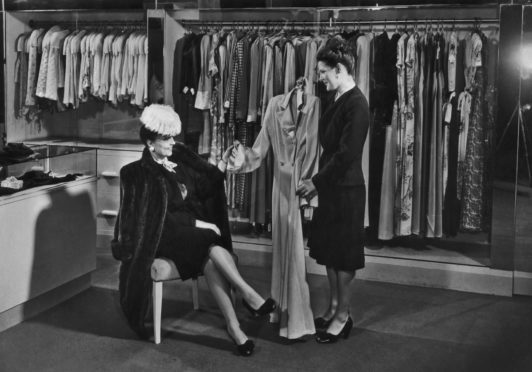I trust you have been wrapping up warm in the freezing weather – you can’t beat a good coat.
I know a woman in Aberdeen, a colleague in fact, who has 25 coats. It sounds like the start of a fairy tale: “Once upon a time there was a woman with 25 coats…”
She must have been keeping that up her sleeve for a while because it did not seem to be common knowledge. I was astounded until I discovered, after making further inquiries, that another female colleague had 22 coats. Is this quite normal then?
Just for the record, and in the interests of clarity, I am talking about outdoor coats. I mean to say the type of coats you put on with an eye on the weather: padded jackets, overcoats, three-quarter length – they all qualify for the purposes of this exercise.
So, I began investigating. It’s not easy sidling up to a woman in the office and just asking off the cuff how many outdoor coats they possess. I thought I might have needed a bullet-proof vest under my coat due to the sheer impudence of it all, but I need not have worried – 12 seemed about average.
I decided to rummage through my wife’s side of the wardrobe. I say “side” – I have a space about 18 inches wide and she has the rest. With my three grandsons rampaging around downstairs as a distraction I could get away with it.
I gazed at her clothes stretching away into the distance like one of the great forests of Scotland, but gave up when I got to 12 coats.
I need some retail therapy because I only have five coats and two of them were recently downgraded to gardening-only wear. Maybe other men have 25 coats.
But when does retail therapy turn into a disease?
We hear a lot about people hooked on drugs, alcohol and food, but less about compulsive shopping addicts.
“Shop until you drop” can actually take on a new meaning if someone becomes suffocated by ruinous debt and mental problems – a vicious circle from which it is almost impossible to escape without help, just like any other serious addiction.
There is absolutely nothing wrong with owning 25 coats, of course. I’d like to get any lingering doubts on that score buttoned up before we go any further and to avoid my colleague smashing my door down.
It’s only right that we enjoy our money and treat ourselves to guilty pleasures. It could be 25 bags, shoes, cufflinks, garden gnomes, model planes in our man sheds or a 25-day luxury cruise. I was admiring my 25 volumes of Captain Jack Aubrey novels in the Patrick O’Brian “Master and Commander” series about Nelson’s navy the other day (I know, not everyone’s cup of grog).
It’s about staying in control of your spending and not becoming a slave to it.
It’s hard because shopping is quite literally a powerful drug.
The pure sensation of shopping and the thrill of expectation triggers intense brain activity which releases endorphin and dopamine chemical substances which have the same effect as drugs on our thought processes.
Perhaps that is why I slip into a trance in a shop when something irresistible is within my grasp and then try to justify it in a mental argument with my inner self, which usually fights a losing battle.
“Oh, but I really need this…I deserve a treat” or “I know I can’t afford it, but I’ll juggle things somehow.”
How many times have we done that in a car showroom?
Temptation is also a powerful drug. If you watch an episode of the Kardashians you might feel an overwhelming urge to rush out and buy a Rolex. A safety valve in our brains would usually put a stop to such nonsense, but compulsive shopping addicts do not have a brake pedal. They buy even if they don’t need anything. They will buy to make themselves feel better because they are depressed about their debt levels, which is similar to excessive binge eating. Others will be secretive and try to hide their problem, just like alcoholics.
The biggest challenge is the oldest: to accept you have a problem and seek professional help before it destroys you and you family.
We all love to buy or collect nice things – even the stars. Johnny Depp reputedly owns special-edition Barbie dolls and Tom Hanks has vintage typewriters.
But what about this? Penelope Cruz is said to own more than 500 non-metal coat hangers. But what about the coats to go with them? That is what I want to know.
You could always donate your cast-offs to a charity shop if it makes you feel better. They say the slide from normality to homelessness and charity handouts in the grip of addiction can be frighteningly quick.
In last week’s Cold Feet comedy drama on TV we saw the character David – a former financial high-flyer now down on his luck – trying on a suit in a church charity shop and finding it was a perfect fit. His estranged wife had donated it.
They say ‘clothes maketh the man’ – a phrase which goes back to the middle ages in Britain, but was also familiar to the Ancient Greeks. It is as true today as ever, but clothes can also cloak a multitude of consumer sins and demons.

